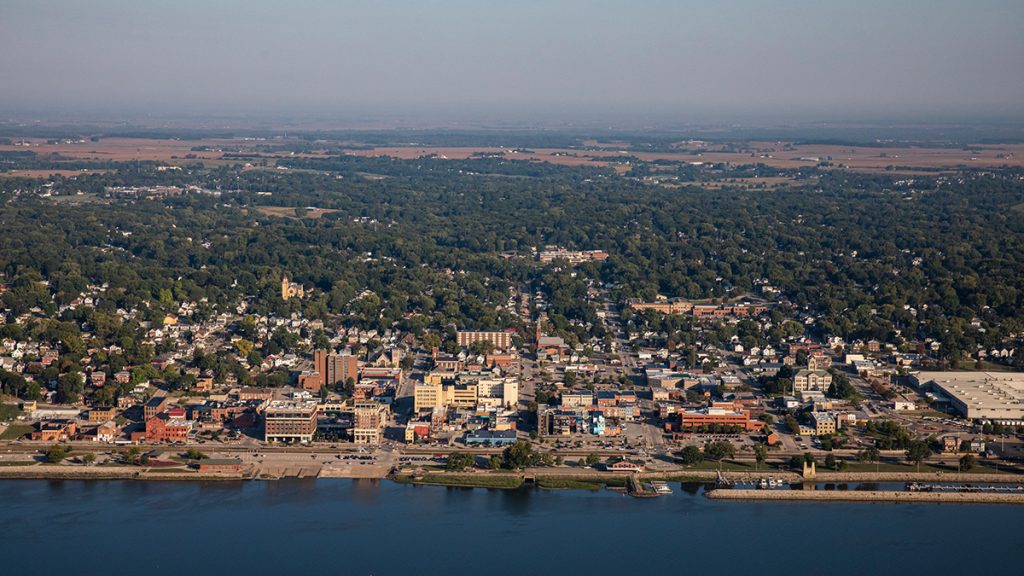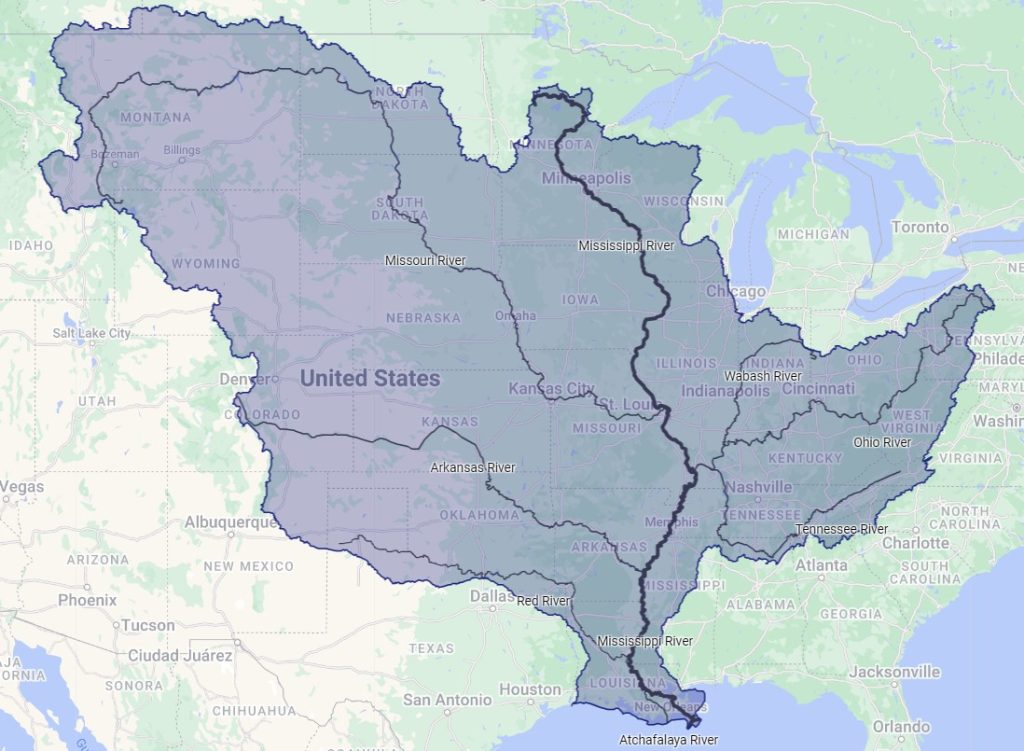Missouri School of Journalism releases groundbreaking report on attitudes toward environment, media in Mississippi River Basin

An aerial view of Muscatine, Iowa on the Mississippi River on Monday, September 18, 2023. Aerial support provided by LightHawk. Photo: Nick Rohlman | The Gazette
COLUMBIA, Mo. (Oct. 23, 2023) — The Missouri School of Journalism has released first-of-its kind research on the attitudes and environmental awareness of people living in the Mississippi River Basin — the largest drainage basin in the United States and a vital environmental and agricultural region. Read the full report here.
With more than 2,300 people surveyed across 10 states along the Mississippi River, the project produced a number of insights, such as:
- A majority of people have noticed significant changes to their state and local environments.
- Residents show strong support for sustainable agriculture methods.
- University scientists and extension agents are among the most trusted sources of science and environmental information.
- Local television remains a go-to media source.
The study was supported by the School’s Donald W. Reynolds Journalism Institute (RJI) and led by assistant professor Kate Rose in collaboration with the Mississippi River Basin Ag & Water Desk, a collaborative network of journalists covering agriculture, water and other environmental issues. States surveyed — Arkansas, Illinois, Iowa, Kentucky, Louisiana, Minnesota, Mississippi, Missouri, Tennessee and Wisconsin — all intersect with the main stem of the Mississippi River. The results will be useful for community organizations, civic and political leaders, media outlets and others throughout the river basin.
David Kurpius, dean of the Missouri School of Journalism, said the report is an example of the School’s push to break down barriers between research and the communities it serves.
“This report is a powerful combination of two of the School of Journalism’s priorities: performing research that has real impacts on the lives of people in Missouri and beyond, and supporting strong community journalism,” Kurpius said. “It’s a perfect demonstration of why RJI continues to support research that gives newsrooms and the public real, actionable tools and insights.”
Notably, when asked about the Mississippi River Basin, many respondents were not aware that they personally lived within the river’s watershed or didn’t recognize its significance. Given that the basin covers more than 40% of the continental U.S. and supplies more than 90% of agricultural exports in the country, Rose said the results demonstrate a need for more outreach and education about the region’s important roles and the basin’s connection to local environments.
“There are a lot of areas where people haven’t been taught some of the basic concepts that are really impacting the areas where they live,” Rose said, noting that flooding, pollution and land use in the basin have consequences for the entire country.
But where the report identifies a challenge, it also presents a possible solution. Many respondents said they wanted to learn more about the river basin.
“We did find that universities and university-connected scientists are really highly-trusted information sources for people within the basin, which is good news,” Rose added. “So we have a sense of the types of information people might need, and we know who they are going to turn to for this information.”
Rose added that the results are a call to action for the universities, journalists, government agencies and other organizations that play a role in keeping people informed about their local environments in the basin.
Randy Picht, executive director of RJI, said this willingness to engage with new information reveals an important opportunity at a time when public trust in news is at a low point.
“People want to know what is going on in their backyard, and community news organizations can fill that demand, not only as traditional newsrooms but through organizations like the Ag & Water Desk, pop-up newsrooms or university extension services,” Picht said. “This report shows that if we reach out, people are willing to listen.”
In addition, the report offers a detailed breakdown of respondents’ use of various news sources for information about the environment, with local television news being the most popular choice.
Things that are happening in our environment are filtering down to the local level — people are beginning to see changes in their own community. They can see that there is drought, flooding, heat, wildfire smoke or other things they didn’t see five, 10 or 20 years ago.
Sara Hiles
These insights serve an important goal of Rose’s research, which is to identify effective methods of communication to people in the basin that the Ag & Water Desk — and any other news source — can use to maximize the impact of their coverage. The Desk distributes environmental reporting for free to news organizations all over the country.
Sara Shipley Hiles, executive director of the Desk and an associate professor at the School, said it is vital to ensure communities have access to accurate, in-depth reporting about what is happening in their region, and another bright spot in the report supports her belief that those communities are ready and willing to listen: nearly 60% of those surveyed believed their states were being affected by changes in the environment.
“Things that are happening in our environment are filtering down to the local level — people are beginning to see changes in their own community,” Hiles said. “They can see that there is drought, flooding, heat, wildfire smoke or other things they didn’t see five, 10 or 20 years ago. And many people in the basin stay local — they live in their local community for a long time, so they can see changes over time.”
Rose said she expects to publish papers on individual aspects of the study over time and is already considering options for related research projects in the region. In addition to Rose, doctoral student Vy Luong and master’s student Julie Freijat also contributed to the report.
For more information on the Desk, which recently received a $2.47 million grant from the Walton Foundation to expand its efforts, click here.
Updated: November 27, 2023
